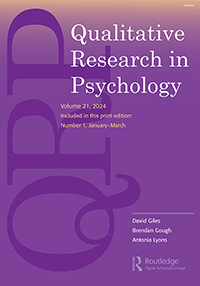波普尔不是实证主义者:为什么批判理性主义可以成为定性和定量社会科学研究的认识论
IF 4.4
3区 心理学
Q1 PSYCHOLOGY, MULTIDISCIPLINARY
引用次数: 8
摘要
摘要本文认为,在社会科学定性和定量方法的文献中,卡尔·波普尔的批判理性主义哲学方法经常被错误地归入实证主义认识论范式。在关于这个问题的其他极具影响力的出版物中,批判性理性主义被认为只是对天真实证主义的一个小而肤浅的改进(后实证主义;例如Guba和Lincoln,1994)。相反,我们认为波普尔是一个坚定的反实证主义者,他的方法更接近于大多数定性研究的认识论信念。除了做任何有用的事情的实用主义之外,批判性理性主义可以作为所有社会科学研究的指导认识论,只要方法论方法的各个方面都可以接受相关的批评。本文章由计算机程序翻译,如有差异,请以英文原文为准。
Popper was not a Positivist: Why Critical Rationalism Could be an Epistemology for Qualitative as well as Quantitative Social Scientific Research
ABSTRACT Within this article we argue that Karl Popper’s philosophical approach of critical rationalism has often been erroneously subsumed under the positivistic epistemological paradigm in the literature on qualitative and quantitative approaches in the social sciences. In other highly influential publications on this issue, critical rationalism has been regarded as merely a small and superficial improvement of naive positivism (post-positivism; e.g. Guba & Lincoln, 1994). In contrast, we argue that Popper was a staunch anti-positivist and that his approach is much closer to the epistemological beliefs that seem to underlie most of qualitative research. Beyond a mere pragmatism in doing whatever is useful, critical rationalism could serve as a guiding epistemology for all social scientific research as long as all aspects of the methodological approach are open to pertinent criticism themselves.
求助全文
通过发布文献求助,成功后即可免费获取论文全文。
去求助
来源期刊

Qualitative Research in Psychology
PSYCHOLOGY, MULTIDISCIPLINARY-
CiteScore
20.00
自引率
0.50%
发文量
14
期刊介绍:
Qualitative Research in Psychology is an international, peer-reviewed journal that publishes high-quality, original research. It aims to become the primary forum for qualitative researchers in all areas of psychology, including cognitive, social, developmental, educational, clinical, health, and forensic psychology. The journal also welcomes psychologically relevant qualitative research from other disciplines. It seeks innovative and pioneering work that advances the field of qualitative research in psychology.
The journal has published state-of-the-art debates on various research approaches, methods, and analytic techniques, such as discourse analysis, interpretative phenomenological analysis, visual analyses, and online research. It has also explored the role of qualitative research in fields like psychosocial studies and feminist psychology. Additionally, the journal has provided informative articles on ethics, transcription, interviewee recruitment, and has introduced innovative research techniques like photovoice, autoethnography, template analysis, and psychogeography.
While the predominant audience consists of psychology professionals using qualitative research methods in academic, clinical, or occupational settings, the journal has an interdisciplinary focus. It aims to raise awareness of psychology as a social science that encompasses various qualitative approaches.
In summary, Qualitative Research in Psychology is a leading forum for qualitative researchers in psychology. It publishes cutting-edge research, explores different research approaches and techniques, and encourages interdisciplinary collaboration.
 求助内容:
求助内容: 应助结果提醒方式:
应助结果提醒方式:


